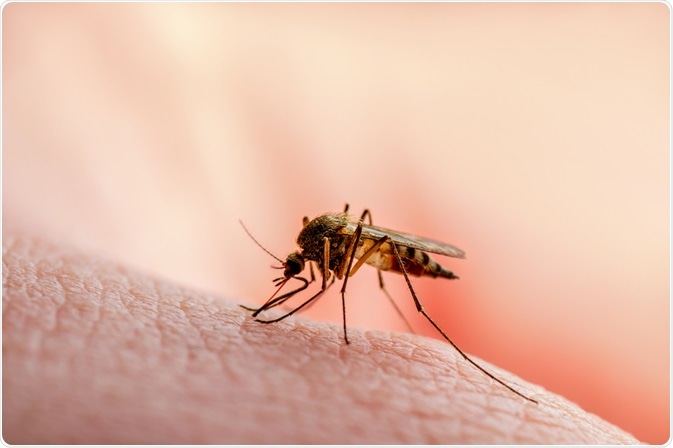Malaria is an infectious disease in tropical countries. It is spread by mosquitoes. It is manifested by fever along with chills and rigors. Unless it is diagnosed and treated promptly, it can be fatal. A single mosquito bite may be enough to cause the infection.
 Image Credit: nechaevkon/Shutterstock.com
Image Credit: nechaevkon/Shutterstock.com
Symptoms of malaria
Features of malaria include high fever over 38C (100.4F) along with chills and sweating. There is intense muscle pain, headache, blurring of vision, and dizziness. Some patients may develop diarrhea and vomiting as well. Symptoms develop within seven days after being bitten or may take between 10 to 15 days to appear.
High-risk areas for malaria
Malaria is found mainly in tropical countries all around the world. It is seen in large parts of Africa and Asia, Central and South America, Haiti and the Dominican Republic, some Pacific islands, such as Papua New Guinea, and some parts of the Middle East.
Malaria is not seen commonly in the United Kingdom. In the United States, around 1,500 cases of malaria are reported every year. Worldwide around 3.3 billion people live in areas at risk of malaria transmission in 106 countries and territories.
In 2010, according to the World Health Organization, there were 216 million episodes of malaria and 655,000 deaths worldwide. Of these deaths around 91% were seen in the African Region, followed by the South-East Asian Region (6%), and the Eastern Mediterranean Region (3%). About 86% of deaths globally were in children.
Causes of malaria
Malaria is caused by a type of parasite known as Plasmodium. This is a microscopic parasite that is transmitted by certain species of mosquitoes. Although there are numerous types of Plasmodia parasites, only four cause malaria in humans. These include:
- Plasmodium falciparum
- Plasmodium vivax
- Plasmodium ovale
- Plasmodium malariae
There is a fifth species causing malaria in humans. It is called Plasmodium knowlesi. It is distributed across South East Asia and is often misdiagnosed as P. malariae. The infection has a potentially more serious and even life-threatening course.
The Plasmodium parasite is mainly spread by female Anopheles mosquitoes, which are night-biting mosquitos.
Diagnosis and treatment of malaria
Malaria is diagnosed by looking at blood samples. The parasites are visible under the microscope. Once the diagnosis is made, treatment should be begun promptly. Almost all individuals make a complete recovery.
Anti-malarial medication is used both to treat and prevent malaria. The type and duration of drugs depend on the type of malaria, its severity, and if the patient is pregnant.
Malaria can sometimes become complicated. Some of the complications include:
- severe anaemia
- cerebral malaria
- malaria during pregnancy
- spleen rupture
- acidosis
- kidney damage
- multi-organ failure etc.
These are more common with malaria caused by P. Falciparum
WHO: Key facts about Malaria (updated)
Prevention of malaria
Malaria can be prevented by taking several simple precautions. Awareness of the risk of malaria in high-risk zones is the first step to preventing malaria. Mosquito bites can be prevented by using covered clothes and mosquito repellents.
While traveling to a malaria-endemic zone, antimalarial tablets may be prescribed to prevent contracting malaria. Immediate diagnosis and treatment can help prevent complications and death.
References
Further Reading
Last Updated: Nov 18, 2022